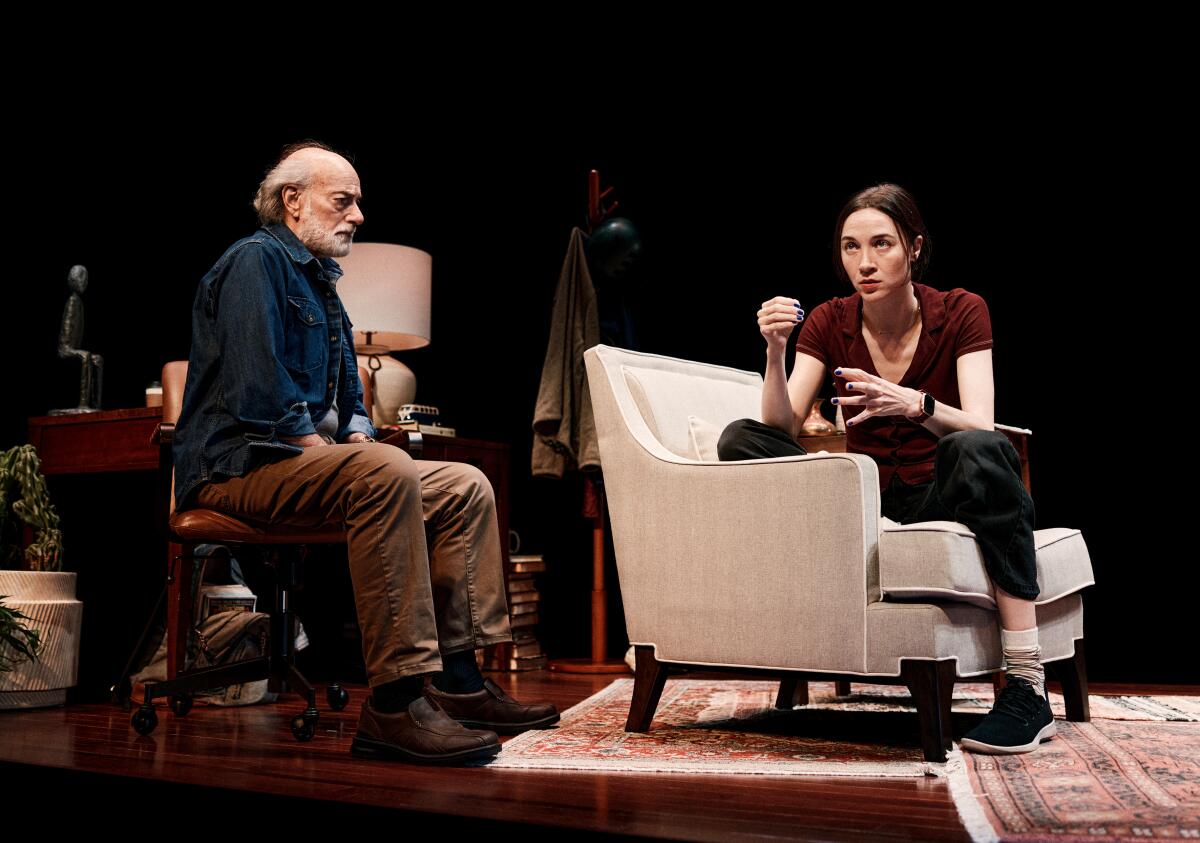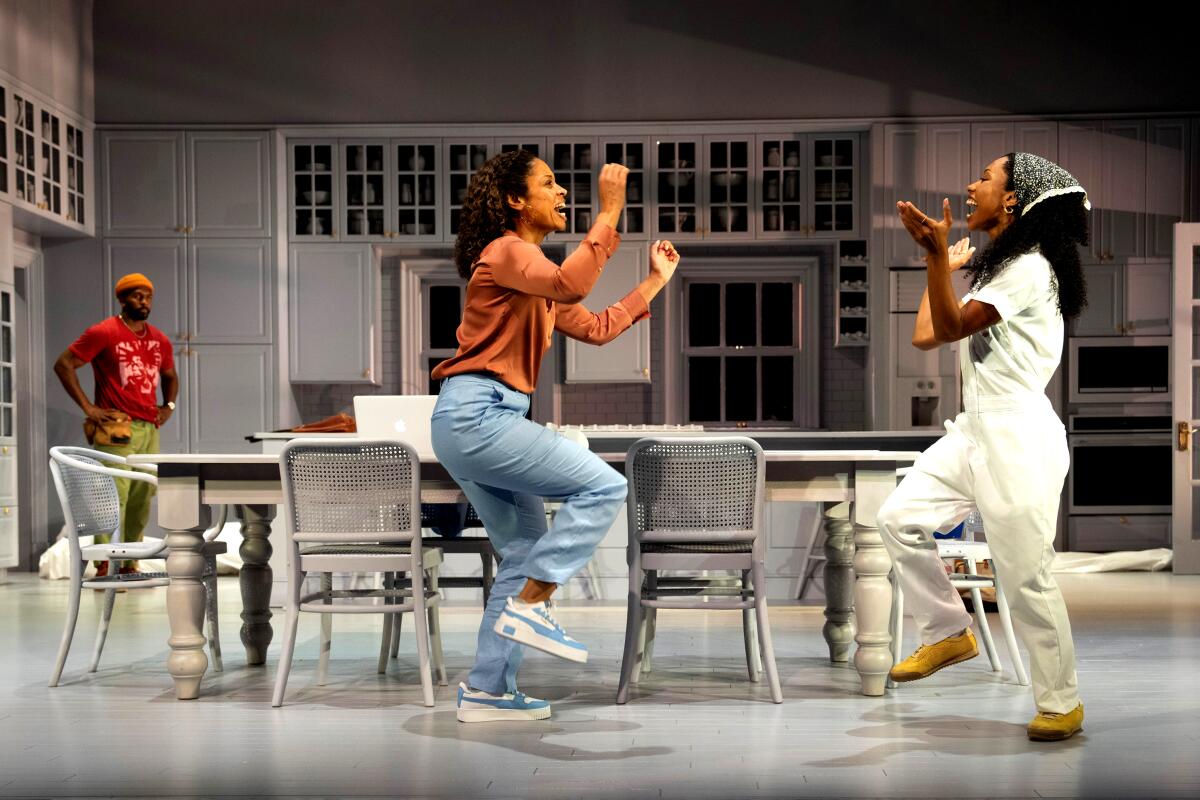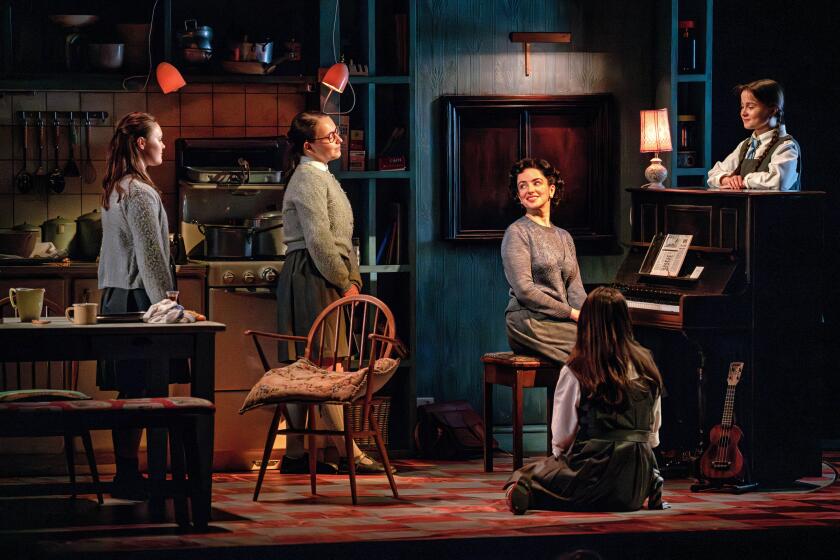Playwrights, back in the spotlight on Broadway, kick-start New Yorkâs fall theater season

New York â Reports of the demise of the straight play on Broadway are greatly exaggerated, at least by the evidence of the fall theater season that has come front-loaded with high-profile drama.
Sam Mendesâ searing production of Jez Butterworthâs âThe Hills of Californiaâ at the Broadhurst Theatre, hands down the best play I saw in a spree of late September playgoing, has become the essential ticket for discerning New York theatergoers this fall. Ayad Akhtarâs âMcNeal,â starring Robert Downey Jr. in his Broadway debut at Lincoln Center Theaterâs Vivian Beaumont, didnât live up to expectations. But who could pass up the opportunity to hear from one of our sharpest playwrights on a subject that has already begun challenging our sense of reality, AI.
I was scheduled to see Jen Silvermanâs âThe Roommate,â starring that most enticing Broadway odd couple, Patti LuPone and Mia Farrow, but illness in the cast scuttled my plans. Still, I managed to pack in, on a four-day itinerary, David Henry Hwangâs âYellow Faceâ (starring Daniel Dae Kim) at Roundabout Theatre Companyâs Todd Haimes Theatre, Max Wolf Friedlichâs âJobâ at the Hayes Theater and, in my one off-Broadway run, James Ijamesâ âGood Bonesâ at the Public Theater. (I also caught the jaunty Broadway revival of âOnce Upon a Mattress,â about which Iâll have more to say when the production, starring Sutton Foster, opens at the Ahmanson Theatre in December.)

It was a pleasure to reencounter âYellow Face,â which had its world premiere at the Mark Taper Forum in 2007. Leigh Silverman, who directed that production, has returned to helm the playâs Broadway premiere, which runs through Nov. 24. This clever comedy is a self-referential work in which Hwang harks back to a theatrical controversy he found himself embroiled in after speaking out against the casting of Jonathan Pryce as a Eurasian character in the 1991 Broadway premiere of âMiss Saigon.â The uproar that followed was more than the Tony-winning playwright had bargained for. But he decided to tackle some of the questions about racial identity that emerged from the casting brouhaha in his play âFace Value,â a spectacular flop that closed in previews on Broadway in 1993.
In âYellow Face,â Hwang reassembles these related events in a comedy that introduces a fictional device to what is otherwise a straightforward recounting. DHH, the playwrightâs surrogate, is now played by Kim, a magnetic screen star (âLost,â âHawaii Five-0â) with Hollywood sex appeal to spare. Any male writer would be flattered to be played by Kim, but the casting is delectably ironic in a play that recalls a time when producers would throw up their hands when asked to find an Asian American leading man to anchor a film or Broadway show.
Silvermanâs production, in other respects, doesnât quite seem as comfortable blown up on a big Broadway stage. Some of the comic acting comes off as cartoonish, but the writing is so smart, fluid and free that it hardly matters. And the scenes between Kimâs DHH and Ryan Eggoldâs Marcus, the purely invented figure in the play, revel in the hilarious hypocrisies that Hwang impishly sends up.
Jez Butterworthâs âThe Hills of California,â directed by Sam Mendes, rises above a strong New York season of playwriting.
The conceit of the play is that DHH has accidentally cast a non-Asian performer as the lead in âFace Value,â and Marcus, grateful for this jump-start to his acting career, takes on a communal advocacy role that only makes the situation more farcically dangerous. DHH is afraid of losing face over his role in making Marcus an Asian American star. He came up with the bright idea of claiming that the actor was of Siberian Jewish heritage when learning the truth of his identity. As the accidental spokesperson for politically conscious casting, heâd rather not be hoisted on his own petard.
Hwangâs self-irony is part of the comic wonder of âYellow Face.â But what is especially refreshing about the play is the way it approaches profoundly serious matters of identity politics with a light touch. Hwang is too agile a playwright to be doctrinaire. He recognizes what must be redressed, but he refuses to lose his sense of humor in the struggle or exempt himself from the human comedy that may be the only reliable equal opportunity employer.

âJob,â which had a much talked-about run last fall off-Broadway at the Soho Playhouse, moved to Broadwayâs Helen Hayes Theater this summer and might be the sleeper of the season. A two-character work, the play (which is scheduled to close on Oct. 27) stars veteran Peter Friedman and Broadway newcomer Sydney Lemmon, a Yale School of Drama graduate who happens to be the granddaughter of Jack Lemmon.
Why has Friedlichâs play become so popular with New York theatergoers? The situation of a young woman showing up at a psychotherapistâs office with a gun sets up a self-contained dramatic situation that audiences seem to relish. Lemmon plays Jane, a content moderator at a tech company, who had a breakdown at the office after being exposed to the most horrific videos and now needs a psychologist to sign off on her return to work. Friedman takes on the role of Loyd, a San Francisco shrink who, in a period of time shorter than two sessions, must somehow dissuade Jane from pulling the trigger.
The contrivances of the situation are inescapable, despite the scrupulous honesty of the performers in director Michael Herwitzâs charged production. (As the Berkeley-educated, aging hippie therapist, Friedman is especially good at dispensing professional empathy to save his own life). The play contains a twist that wild horses couldnât drag out of me, but how convinced youâll be depends on your willingness to succumb to a plot that has been carefully programmed to ratchet up the dramatic tension. I remained at a skeptical remove, but I appreciated the absorption of my fellow audience members, who were more than happy to suspend disbelief and hop on an 80-minute dramatic thrill ride.

The final play on my itinerary was âGood Bones,â by Ijames, a playwright Iâve been eager to get to know better after âFat Ham,â his brilliantly hilarious Pulitzer Prize-winning riff on âHamlet.â âKill Move Paradise,â an earlier Ijames play still running at the Odyssey Theatre, constructs an emergency racial justice ritual to confront the epidemic of fatal police shootings of unarmed Black people. âGood Bones,â a play about a married couple, Travis (Mamoudou Athie) and Aisha (Susan Kelechi Watson), who are renovating a townhouse in the city where Aisha grew up, is much more conventional in form.
Aisha, who grew up poor, has a love-hate relationship with her hometown. She works for a company thatâs erecting a sports complex that is going to tear down the same projects that she used to call home. Her husband, a chef from a more affluent background, is opening an upscale soul food restaurant in the midtown area. The two embody the spirit of gentrification, but they have as many differences between them as they have with Earl (Khris Davis), a meticulous contractor who still lives in the projects that Aisha wants to dismantle.
Ijames sets up debate drama in which the characters bring their unique life histories to the conflict. Earlâs sister Carmen (TĂŠa Guarino), a finance major at the University of Pennsylvania, introduces a different generational viewpoint when she joins her brother to finish the renovation job.
Robert Downey Jr. makes his Broadway debut playing a writer who succumbs to AI in the world premiere of Ayad Akhtarâs âMcNealâ at Lincoln Center Theaterâs Vivian Beaumont.
The production, directed by Ijamesâ frequent collaborator Saheem Ali, unfolds in the spacious modern kitchen that Earl is painstakingly refurbishing to restore this historic townhouse to its former luster. The scenic design (Maruti Evans) and costumes (Oana Botez) maximize the productionâs televisual appeal. Perhaps this is the reason that âGood Bonesâ sometimes comes off as a TV pilot. The play has urgent social concerns that are right at home at a theater like the Public, where it runs through Oct. 27, but pat resolutions and a little too much window-dressing prevent the conflicts from becoming uncomfortably real.
âFat Ham,â âKill Move Paradiseâ and âGood Bonesâ are written in such different styles they could be the works of three separate authors. Except that each play is urgently concerned with the lifeblood of community. For Ijames, that includes not only who is onstage but who is in the audience. Expanding the circle of theatergoers isnât an afterthought but an imperative for a playwright who recognizes that drama, at its most flourishing, serves as a societal meeting point.
My New York theatergoing brought this dynamism home to me, confirming that a theory of physics holds true for drama. When spectators enter a fictional world, their very presence changes what they observe. Proof of this concept is everywhere in a busy New York fall season that is fostering deeper connections between playwrights and their attentive public.
More to Read
The biggest entertainment stories
Get our big stories about Hollywood, film, television, music, arts, culture and more right in your inbox as soon as they publish.
You may occasionally receive promotional content from the Los Angeles Times.













